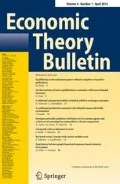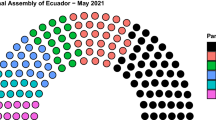Abstract
We propose a variant of the nucleolus associated with distorted satisfaction of each coalition in TU games. This solution is referred to as the \(\alpha \)-nucleolus in which \(\alpha \) is a profile of distortion rates of satisfaction of all the coalitions. We apply the \(\alpha \)-nucleolus to constant-sum weighted majority games. We show that under assumptions of distortions of satisfaction of winning coalitions the \(\alpha \)-nucleolus is the unique normalized homogeneous representation of constant-sum weighted majority games which assigns a zero to each null player. As corollary of this result, we derive the well-known Peleg’s representation theorem.
Similar content being viewed by others
Notes
For all \(z\in \mathbb {R} ^{2^{N}}\), \(\theta (z)\in \mathbb {R} ^{2^{N}}\) is defined by rearranging the coordinates of z in non-decreasing order. For all \(z,z^{\prime }\in \mathbb {R} ^{2^{N}}\), z is lexicographically larger than \( z^{\prime }\) if \(\theta _{1}(z)>\theta _{1}(z^{\prime })\) or [\(\theta _{1}(z)=\theta _{1}(z^{\prime })\) and \(\theta _{2}(z)>\theta _{2}(z^{\prime })\)] or [\(\theta _{1}(z)=\theta _{1}(z^{\prime })\) and \(\theta _{2}(z)=\theta _{2}(z^{\prime })\) and \(\theta _{3}(z)>\theta _{3}(z^{\prime })\)], and so on. Then, we write \(z\ge _{lex}z^{\prime }\).
Theorem 5.1.14 is itself a consequence of Theorems 5.1.6 and Corollary 5.1.10 in Peleg and Sudhölter (2003).
An \(2^{N}\)-dimensional vector \(\mathbf {0}=(0,0,\dots ,0)\).
An \(2^{N}\)-dimensional vector \(\mathbf {1}=(1,1,\dots ,1)\).
“ENSC” means “Egalitarian Non-Separable Contribution”.
Since the nucleolus is a normalized representation (Peleg 1968, Theorem 3.4), the set of normalized representations of \(G^{*}\), denoted X, is nonempty. Let \(r\equiv q(x)\) for all \(x\in X\ne \emptyset \). We consider two cases. Case 1: A unique veto player exists in \(G^{*}\). By Claim 1, let \(i^{*}\) be a unique veto player. Let us consider the following problem: \(\max r\) subject to \(x_{i^{*}}\ge r\), \(x_{i}\ge 0\) for all \( i\in N\backslash \{i^{*}\}\), and \(x(N)=1\). The optimal solution is \(r=1\) , which is attainable by \(x\in \mathbb {R} ^{N}\) such that \(x_{i^{*}}=1\) and \(x_{i}=0\) for all \(i\in N\backslash \{i^{*}\}\). Since x is an imputation and \(r>1/2\), there exists \(\max q(x)\) in this case. Case 2: No veto player exists in \(G^{*}\). By Claim 2, a normalized representation is an imputation. Let us consider the following problem: \(\max r\) subject to \(x(S)\ge r>1/2\) for all \(S\in \mathcal {W}^{m}\), \(x_{i}\ge 0\) for all \(i\in N\), and \(x(N)=1\). Since the nucleolus is feasible for the problem and the objective function is bounded above, there exists \(\max q(x)\) in this case. By the argument of the two cases mentioned above, \(\max q(x)\in (1/2,1]\).
References
Davis, M., Maschler, M.: The kernel of a cooperative game. Naval Res. Logist. Q. 12, 223–259 (1965)
Hou, D., Sun, P., Xu, G., Driessen, T.: Compromise for the complaint: an optimization approach to the ENSC value and the CIS value. J. Oper. Res. Soc. 69, 571–579 (2018)
Maschler, M.: The bargaining set, kernel, and nucleolus. In: Aumann, R., Hart, S. (eds.) Handbook of Game Theory with Economic Applications, pp. 591–667. Elsevier, Amsterdam (1992)
Milnor, J.: Reasonable Outcomes for n-Person Games. Research Memorandum, vol. 916. The Rand Corporation, Santa Monica (1952)
Peleg, B.: On weights of constant-sum majority games. SIAM J. Appl. Math. 16, 527–532 (1968)
Peleg, B., Sudhölter, P.: Introduction to the Theory of Cooperative Games. Kluwer Academic Publishers, Boston (2003)
Rawls, J.: A Theory of Justice. Oxford University Press, Oxford (1971)
Schmeidler, D.: The nucleolus of a characteristic function game. SIAM J. Appl. Math. 17, 1163–1170 (1969)
von Neumann, J., Morgenstern, O.: Theory of Games and Economic Behavior. Princeton University Press, Princeton (1944)
Acknowledgements
I would like to thank the editor and an anonymous referee for remarkably insightful and detailed suggestions. I would also like to thank Tamás Solymosi for helpful discussions and kind hospitality for my visit at Corvinus University of Budapest. For useful comments, I am grateful to Shin Sakaue. I am financially supported by JSPS KAKENHI Grant-in-Aid for Young Scientists (B), Project #17K13751. I am responsible for any remaining errors.
Author information
Authors and Affiliations
Corresponding author
Additional information
Publisher's Note
Springer Nature remains neutral with regard to jurisdictional claims in published maps and institutional affiliations.
Rights and permissions
About this article
Cite this article
Oishi, T. A generalization of Peleg’s representation theorem on constant-sum weighted majority games. Econ Theory Bull 8, 113–123 (2020). https://doi.org/10.1007/s40505-019-00171-7
Received:
Accepted:
Published:
Issue Date:
DOI: https://doi.org/10.1007/s40505-019-00171-7
Keywords
- Constant-sum weighted majority games
- Homogeneous representation
- \(\alpha \)-Nucleolus
- Distorted satisfaction
- Peleg’s representation theorem




